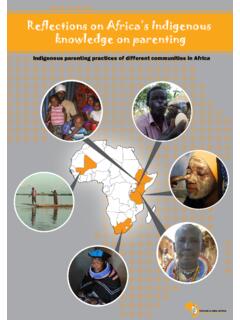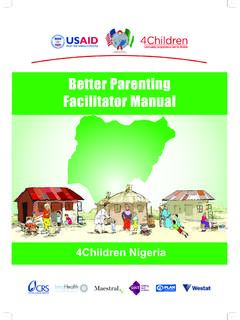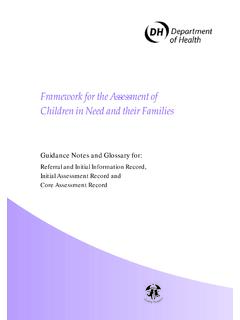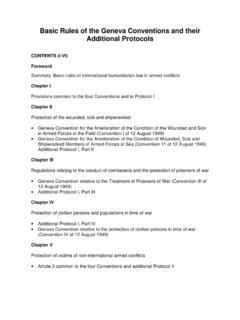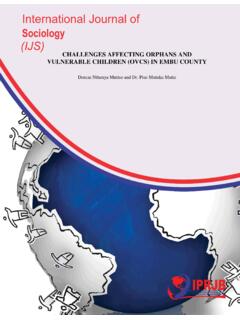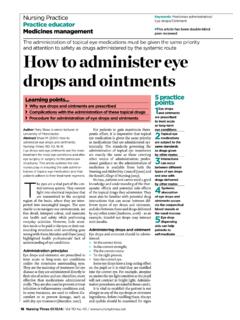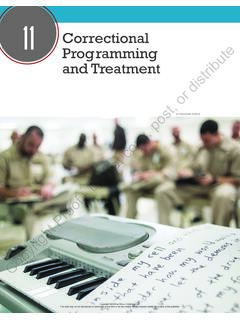Transcription of Psychosocial Support Training Manual - Better Care Network
1 Farm Orphan Support Trust of Zimbabwe Psychosocial Support Training Manual Produced by FOST with Support from REPSSI and JSI(UK)FOST PSS Manual 2 Copyright Farm Orphan Support Trust of Zimbabwe (FOST) 2005 This publication was made possible through the Support of John Snow International, Europe and the Department for International Development (DFID). The opinions expressed herein are those of the author and do not necessarily reflect the views of DFID. ( Contract number dfRC/ZW 023844.)
2 The content of this Manual may be freely reproduced, published or otherwise used for no-profit purposes without permission from FOST. FOST reserves the right, however, to be cited as the source of the information. Written by Lynn Walker, FOST Edited by Samuel Kumbula and Maxwell Vheremu, FOST Copy edited by Ken Dixon and Zanele Maphosa, FOST FOST PSS Manual 3 Manual CONTENTS Introduction Acknowledgements 4 Why should FOST have a Training Manual for PSS? 5 Objectives of the Manual 6 Who will use the Manual ?
3 6 Using this Manual 7 Training Activities Topic Insights into our own experiences of loss and grief 9 Handout 1 Insights into loss and grief 11 Topic What do we mean by Psychosocial Support for orphaned and vulnerable children? 12 Topic Child development and children s basic needs 15 Handout 2 Basic Needs of Children 18 Handout 2a Who provides for basic needs of children? 20 Topic Understanding loss and grief in children 21 Topic Bereavement and children 23 Handout 3a Bereavement and children aged 2-6 years 25 Handout 3b Bereavement and children aged 6-12 years 27 Handout 3c Bereavement and children aged 12-16 years 30 Topic Dealing with aggressive behaviour 32 Handout 4 Dealing with aggressive behaviour 34 Topic Overcoming stigma and discrimination 36 Topic What makes children happy or sad?
4 40 Topic Memory Projects 44 Topic Community Support for vulnerable children 47 Tips for Group Work Using small groups 50 Ways of dividing participants into small groups 51 Handling feedback and plenary sessions 54 Appendices Background information Children affected by HIV and AIDS 56 Glossary Terms often used in PSS 58 FOST PSS Manual 4 Acknowledgements The Manual is a product of several years of experience by FOST in the provision of community-based, sustainable Support for children affected by HIV and AIDS.
5 The materials contained in the Manual are inspired by the members of staff and many community volunteers who have contributed to the FOST programme over many years and incorporates the ideas and experience of other practitioners in the field of PSS. In particular FOST would like to acknowledge the contribution and Support of the following: Regional Psychosocial Support Initiative (REPSSI) for giving FOST the resources and technical Support to embark on this project and develop the Materials. John Snow International (JSI, UK) for Training the FOST team in Documentation and Communication Skills which helped us structure our ideas into this product, and by then supporting the publication of this Manual .
6 In addition, the JSI(UK) Young People: We Care Manual was an inspiration for this product and helped us develop some of the activities in this Manual . Building Blocks in Practice toolkit, produced by the International HIV/AIDS Alliance. Some activities in this excellent toolkit have been adapted for this Manual . Humuliza Project, Tanzania, for the initial Training of FOST Staff in PSS and producing the first materials we used. Many of the sessions and materials in this Manual are influenced by their work.
7 Catholic AIDS Action, for their excellent book Building Resiliency Among Children Affected by HIV /AIDS . Many of their ideas and suggestions have been incorporated into this Manual . The FOST volunteers and stakeholders who allowed themselves to be guinea pigs for the materials contained in this Manual and who gave honest and constructive feedback. The children and young people who contributed to the ideas and helped us to remember the real value of love and caring to all children in Zimbabwe.
8 Finally, sincere thanks must go to Jonathan Brakarsh for the many therapeutic cups of coffee and accompanying discussions about PSS that helped FOST to shape it s ideas and approaches to PSS. FOST PSS Manual 5 WHY SHOULD WE HAVE A Training Manual FOR Psychosocial Support ? FOST was one of the first organisations in the region to recognise that the emotional, social and cultural needs of children are as important as their material needs. As a result, since the inception of FOST we have advocated care of orphaned children in their community rather than institutionalized care arrangements.
9 Over time we began to realise that, although this policy was being advocated and promoted in principle, the main focus and concern for community members, volunteers and many programme staff has been material needs. This is only natural and has become more pressing as the economic and material situation of communities has deteriorated. We have also noted that these communities are feeling totally overwhelmed with their situation and feeling powerless to Support the many children affected by HIV and AIDS in their villages.
10 Many volunteers report feeling embarrassed to turn up at the households of vulnerable children empty-handed and sometimes do not visit these children because they feel they have nothing to offer. Feedback from the children and young people in the farm communities, especially from the very young children1, however, served to remind us and re-emphasise the fact that, even in times of real material hardship, the invisible Psychosocial Support offered to children by their neighbours makes a real difference to them and that this is valued as much, if not more, than the material Support being offered.

